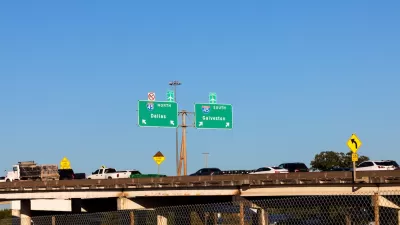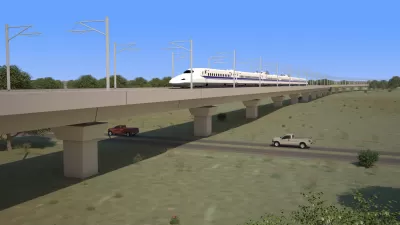Christian McPhate and Ashlea Sigman provide a thorough and insightful read about the environmental impacts of Texas' water management policies, especially along the Brazos River, a drought-stricken water supply that cuts across the state.
"The state’s water development board says two-thirds of the state is now grappling with severe to moderate drought, and statewide reservoir storage is the lowest it’s been since 1990," explain McPhate and Sigman in describing the larger context for the article's discussion of the state's water policy controversies.
"As the drought drags on, labyrinthine laws that allocate increasingly scarce water supplies in Texas are setting farmers against manufacturers, community against community, and state agency against state agency."
As its case study, the article focuses on the example of the Brazos River.
"Today, there’s simply not enough water flowing in the Brazos River to satisfy all the water rights claimed by cities, farmers and industry" and "the river is in a death grip…"
The article starts with a poetic nod to Goodbye to a River by John Graves, and goes on to discuss such critical policy issues as the state's "prior appropriations system," which prompted a 2012 lawsuit involving Dow Chemical (in November 2012, the plant’s daily water consumption of 155 million gallons a day far exceeded the 143 million gallons of water used daily by the 1.3 million residents of Dallas).
Following on that expansive coverage, the Dallas News recently published an editorial calling for reform of the "prior appropriations system." According to the editors of the paper, "it makes little sense for Texas to perpetuate an antiquated “prior appropriations system” that guarantees priority downstream water rights to riverside industries based on seniority." The editorial cites research from the Denton Record-Chronicle and graduate journalism students at the University of North Texas to make the case against the same Dow Chemical example examined by McPhate and Sigman.
FULL STORY: Battling over the Brazos

Planetizen Federal Action Tracker
A weekly monitor of how Trump’s orders and actions are impacting planners and planning in America.

Maui's Vacation Rental Debate Turns Ugly
Verbal attacks, misinformation campaigns and fistfights plague a high-stakes debate to convert thousands of vacation rentals into long-term housing.

San Francisco Suspends Traffic Calming Amidst Record Deaths
Citing “a challenging fiscal landscape,” the city will cease the program on the heels of 42 traffic deaths, including 24 pedestrians.

Amtrak Rolls Out New Orleans to Alabama “Mardi Gras” Train
The new service will operate morning and evening departures between Mobile and New Orleans.

The Subversive Car-Free Guide to Trump's Great American Road Trip
Car-free ways to access Chicagoland’s best tourist attractions.

San Antonio and Austin are Fusing Into one Massive Megaregion
The region spanning the two central Texas cities is growing fast, posing challenges for local infrastructure and water supplies.
Urban Design for Planners 1: Software Tools
This six-course series explores essential urban design concepts using open source software and equips planners with the tools they need to participate fully in the urban design process.
Planning for Universal Design
Learn the tools for implementing Universal Design in planning regulations.
Heyer Gruel & Associates PA
JM Goldson LLC
Custer County Colorado
City of Camden Redevelopment Agency
City of Astoria
Transportation Research & Education Center (TREC) at Portland State University
Jefferson Parish Government
Camden Redevelopment Agency
City of Claremont





























